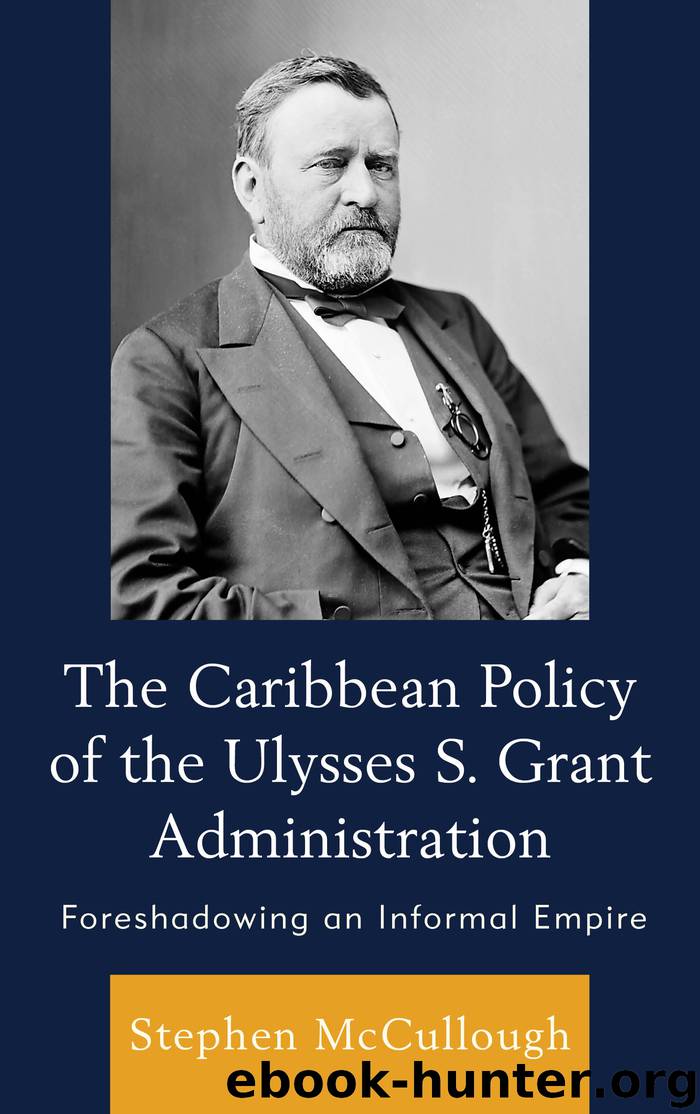The Caribbean Policy of the Ulysses S. Grant Administration by Stephen McCullough

Author:Stephen McCullough
Language: eng
Format: epub
Tags: undefined
Publisher: Lexington Books, a division of Rowman & Littlefield Publishers, Inc.
Published: 2012-02-29T16:00:00+00:00
The Debate
In Spain, Prim publicly projected confidence that Spain could retain Cuba. The Spanish government’s news releases on the condition of the island were always upbeat, but in private Sickles claimed that many Spaniards talked of the trouble they faced in subduing the insurgency.[31] While the erratic Sickles was prone to presenting only evidence that supported his argument, he also made numerous Spanish contacts among those advocating the creation of a republic. Fish could not ignore Sickles dispatches.
Fish also received sound advice from his old friend and Cuban expert,
B. H. Wright, who declared that no matter what happened in Spanish politics, no politician would risk his career to advocate letting Cuba go.[32] This tempered Fish’s actions, forcing him to focus on more realistic goals than ending Spanish rule on the island. He solicited his friends’ opinions on the U.S. course of action and used his correspondents as sounding boards for his fears regarding U.S. involvement in Cuba. Fish was not certain how to keep the United States out, but it needed to abstain from the conflict.
Fish openly wondered if Cuban bribes were behind the press campaign to recognize belligerency. And if the United States did so, to whom would it grant such status? No Cuban government was worthy of the name, Fish argued. All U.S. recognition could do was force the downfall of the weak Spanish government and cause war with Spain. U.S. commerce with Spain would be liable to search and seizure. If the United States were drawn into a war with Cuba, the navy needed to be vastly expanded before matching the Spanish fleet. The U.S. Army could land in Cuba, but it would face not only the Spanish soldiers and volunteers, but yellow fever and cholera as well. Fish had been asked by his opponents, “why should we be bound by rules of international law? We are strong enough to say what the law ought to be, and we are young enough not to be bound by what was law fifty years ago.” What should the United States do? If it occupied Cuba, “we add some six hundred thousand Negroes, who can speak no word of English, to our voting population, and some eight hundred thousand Spaniards and Cubans equally ignorant of our laws, language and customs.”[33] Fish not only distrusted blacks, but remained suspicious of Roman Catholics and Latin Americans in general.
What drove his Cuban policy was his fear of its almost 600,000 blacks who were “less educated, less civilized than those where lately slaves in our Southern states.” During a visit to Cuba in 1855 Fish commented that “with its present population, the island of Cuba will be anything else than a desirable acquisition to the United States, and I can see no means of getting rid of a population of some 450,000 called white but really of every shade and mixture of color, who own all the land on the island.”[34] Fish’s racial views were hardly uncommon within his social set. The distinguished jurist
Download
This site does not store any files on its server. We only index and link to content provided by other sites. Please contact the content providers to delete copyright contents if any and email us, we'll remove relevant links or contents immediately.
| Africa | Americas |
| Arctic & Antarctica | Asia |
| Australia & Oceania | Europe |
| Middle East | Russia |
| United States | World |
| Ancient Civilizations | Military |
| Historical Study & Educational Resources |
In Cold Blood by Truman Capote(3374)
The Innovators: How a Group of Hackers, Geniuses, and Geeks Created the Digital Revolution by Walter Isaacson(3149)
Steve Jobs by Walter Isaacson(2889)
All the President's Men by Carl Bernstein & Bob Woodward(2364)
Lonely Planet New York City by Lonely Planet(2217)
And the Band Played On by Randy Shilts(2197)
The Room Where It Happened by John Bolton;(2150)
The Poisoner's Handbook by Deborah Blum(2135)
The Innovators by Walter Isaacson(2098)
The Murder of Marilyn Monroe by Jay Margolis(2095)
Lincoln by David Herbert Donald(1982)
A Colony in a Nation by Chris Hayes(1927)
Being George Washington by Beck Glenn(1915)
Under the Banner of Heaven: A Story of Violent Faith by Jon Krakauer(1788)
Amelia Earhart by Doris L. Rich(1689)
The Unsettlers by Mark Sundeen(1682)
Dirt by Bill Buford(1670)
Birdmen by Lawrence Goldstone(1662)
Zeitoun by Dave Eggers(1643)
